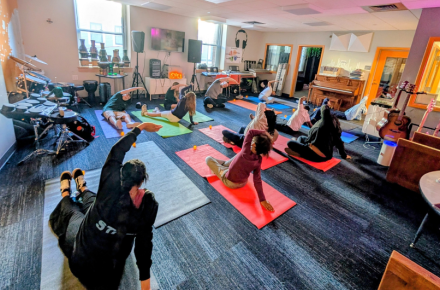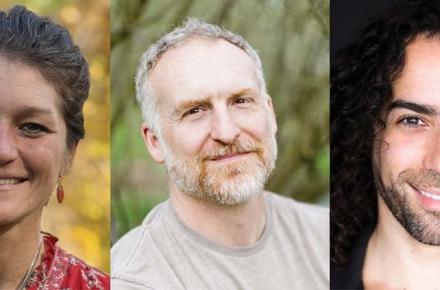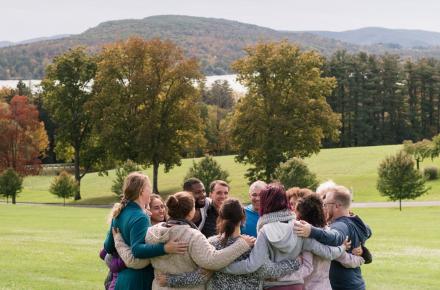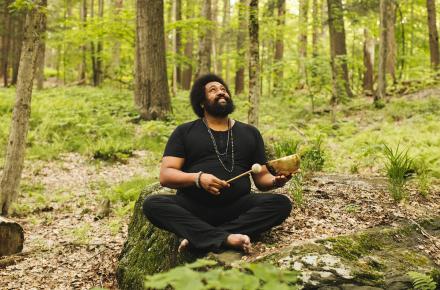Soul Retrieval

by Sandra Ingerman
Shamanism is the oldest spiritual practice known to humankind. We know from the archaeological evidence that shamanism was practiced all over the world for at least 40,000 years. However many anthropologists believe that the practice dates back over 100,000 years.
The word “shaman” comes from the Tungus tribe in Siberia, and means “one who sees in the dark.” Shamanism has been practiced in parts of Asia, Europe, Africa, Australia, Greenland, and Native North and South America.
A shaman is a man or woman who interacts directly with spirits to address the spiritual aspects of illness, perform soul retrievals, divine information, help the spirits of deceased people cross over, and perform a variety of ceremonies for the community. Shamans have taken on many roles in tribal communities. They have acted as healers, doctors, priests, psychotherapists, mystics, and storytellers.
Shamans look at the spiritual form of illness which might manifest on an emotional or physical level. When I was doing the research for my book Soul Retrieval: Mending the Fragmented Self, I found that most shamanic cultures around the world believe that illness is due to the loss of the soul.
Many believe that, whenever we suffer an emotional or physical trauma, a part of our soul flees the body in order to survive the experience. The definition of soul that I am using is soul as our essence, life force, the part of our vitality that keeps us alive and thriving.
The types of trauma that could cause soul loss in our culture would be any kind of abuse sexual, physical, or emotional. Other causes could be an accident, being in a war, being a victim of a terrorist act, acting against our morals, being in a natural disaster (a fire, hurricane, earthquake, tornado, etc.), surgery, addictions, divorce, or death of a loved one.
Any event that causes shock could cause soul loss. And what might cause soul loss in one person might not cause soul loss in another.
It is important to understand that soul loss is a good thing that happens to us. It is how we survive pain. If I was going to be in a head-on car collision, the last place I would want to be at the point of impact is in my body. My psyche could not endure that kind of pain. So our psyches have this brilliant self-protection mechanism, where a part of our essence or soul leaves the body so that we do not feel the full impact of the pain.
In psychology, we call this disassociation. But, in psychology, we don’t talk about what disassociates and where that part goes. In shamanism, we understand that a piece of the soul leaves the body and goes to a territory in what shamans call non-ordinary reality, where it waits until someone intervenes in the spiritual realms and facilitates its return.
Although soul loss is a survival mechanism, the problem, from a shamanic point of view, is that the soul part that left usually does not come back on its own. The soul might be lost, or stolen by another person, or doesn’t know the trauma has passed and it is safe to return.
It has always been the role of the shaman to go into an altered state of consciousness and track down where the soul fled to in the alternate realities and return it to the body of the client.
There are many common symptoms of soul loss. One of the more common ones is dissociation, in which a person does not feel fully in their body, alive, and engaged with life. Other symptoms include chronic depression, suicidal tendencies, post-traumatic stress syndrome, immune deficiency problems, and grief that just does not heal. Addictions are also a sign of soul loss, as we seek external sources to fill up the empty spaces inside of us, whether through substances, food, relationships, work, or buying material objects.
Anytime someone says, “I have never been the same since …” and they don’t mean this in a good way, soul loss has probably occurred.
You can see how much soul loss there is today, as we prioritize money over life. Those who say that we have to kill other life forms for material gain must be suffering from soul loss. Those who feel that buying one more car or gathering material objects will bring happiness are suffering from the loss of soul. As you can see, we are looking at a great deal of planetary soul loss today, given how we behave toward each other and the rest of life.
Recently, there has been a resurgence of interest in the practice of shamanism. We now have many hundreds of wonderful shamanic practitioners reintroducing the practice of soul retrievals into our culture. It is interesting to note that, as soul loss was so understood in shamanic cultures, people who suffered traumas were given a soul retrieval within three days after a trauma occurred. Today, as we have not been practicing soul retrieval for so long, practitioners are going back 10, 20, 30, or 40 years or even more, looking for lost soul parts.
Also, in a shamanic culture, the individuals knew what was out of balance in their lives that might have caused an illness or issue to occur. In our culture, we are often unaware of what is not in spiritual harmony and is thus creating illness. And, because our soul loss often happened when we were very young, we are unaware of the unconscious patterns we are living out due to our first experience of soul loss. We are always trying to retrieve our soul. We do this by repeating the same trauma over and over again. The names of the people involved might change, but the story is often the same.
The effects of having a soul retrieval vary from person to person. Some people feel that they are more grounded in their body and feel more solid. Some people feel lighter, and a joyful way of being returns to them. For some, memories of the past traumas might be triggered, bringing up a variety of feelings to work through. And, for some people, the effects are too subtle to notice until further work to integrate the soul is done.
When we talk about soul, we are really talking about light. In returning the soul parts and lost vitality to the client, we are really returning light. I stress the need for the client to fully absorb the light from the returned soul/essence into every cell of the body. It is our birthright to fully express our soul and create the world we want to live in. And it is our birthright to shine as brightly as the stars above us.
Find out about upcoming programs on soul retrieval at Kripalu.
This article is excerpted from a longer piece originally published on Sandra Ingerman's website.


































